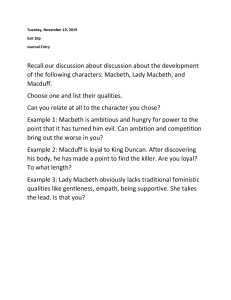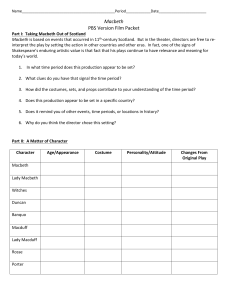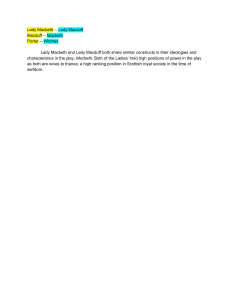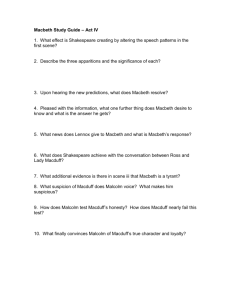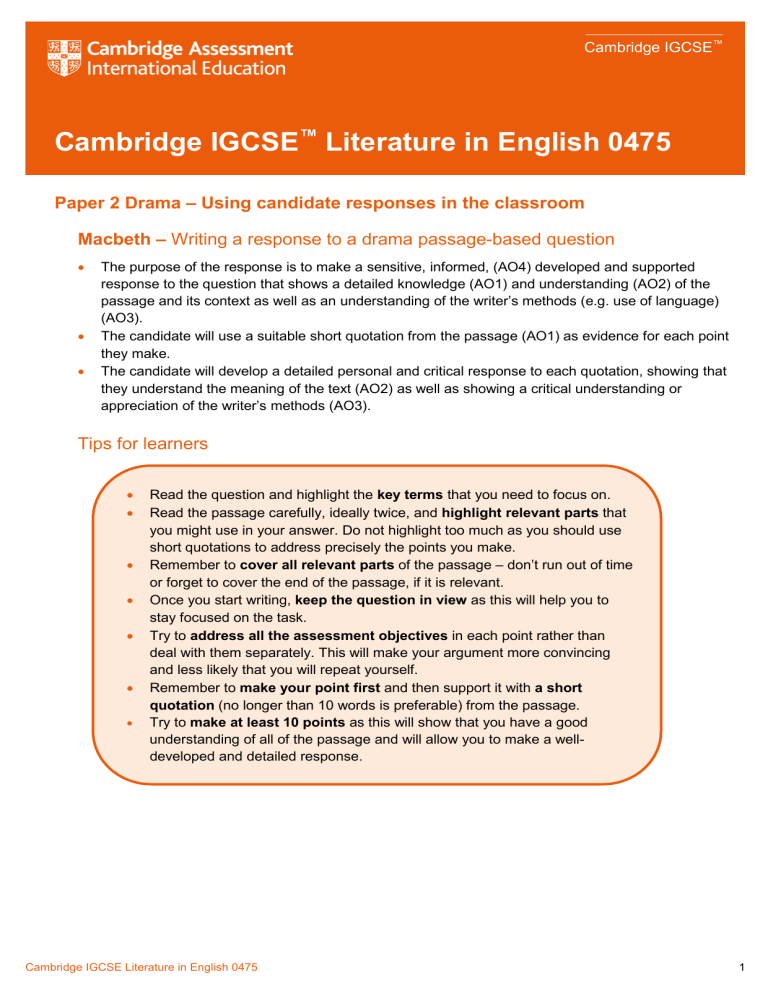
Cambridge IGCSE™ Cambridge IGCSE™ Literature in English 0475 Paper 2 Drama – Using candidate responses in the classroom Macbeth – Writing a response to a drama passage-based question • • • The purpose of the response is to make a sensitive, informed, (AO4) developed and supported response to the question that shows a detailed knowledge (AO1) and understanding (AO2) of the passage and its context as well as an understanding of the writer’s methods (e.g. use of language) (AO3). The candidate will use a suitable short quotation from the passage (AO1) as evidence for each point they make. The candidate will develop a detailed personal and critical response to each quotation, showing that they understand the meaning of the text (AO2) as well as showing a critical understanding or appreciation of the writer’s methods (AO3). Tips for learners • • • • • • • Read the question and highlight the key terms that you need to focus on. Read the passage carefully, ideally twice, and highlight relevant parts that you might use in your answer. Do not highlight too much as you should use short quotations to address precisely the points you make. Remember to cover all relevant parts of the passage – don’t run out of time or forget to cover the end of the passage, if it is relevant. Once you start writing, keep the question in view as this will help you to stay focused on the task. Try to address all the assessment objectives in each point rather than deal with them separately. This will make your argument more convincing and less likely that you will repeat yourself. Remember to make your point first and then support it with a short quotation (no longer than 10 words is preferable) from the passage. Try to make at least 10 points as this will show that you have a good understanding of all of the passage and will allow you to make a welldeveloped and detailed response. Cambridge IGCSE Literature in English 0475 1 Examination question We have annotated the question below with some guidance for learners to help them prepare their answer and encourage them to focus on what the question is asking for. This information is not given to candidates in the examination. The key terms of this question are ‘How?’ and ‘powerfully dramatic’. It is asking you to focus on the dramatic impact of Shakespeare’s writing – his use of language. Once you have read through the question instructions, you need to identify the key terms in the question and which sections of the passage you are going to use. WILLIAM SHAKESPEARE: Macbeth Remember to support your ideas with details from the writing. Read this passage carefully, and then answer the question that follows it: Alarums. Enter MACDUFF Macduff: That way the noise is. Tyrant, show thy face. If thou beest slain and with no stroke of mine, May wife and children’s ghost will haunt me still … to Macbeth: … Before my body, I throw my warlike shield. Lay on, Macduff, And damn’d by him that first cries ‘Hold, enough!’ You need to show briefly that you understand the context of the passage (what has led up to this moment and what happens immediately afterwards) and how this adds to what is dramatic about this moment in the play. How does Shakespeare make this a powerfully dramatic moment in the play? You need to support each point you make with a short quotation from the passage. [The full passage will be printed on the exam paper. This passage, of 65 lines, is taken from Act 5, Scenes 7 and 8.] You have 45 minutes to read the passage and to write your answer: it needs to be long enough and with enough detailed reference to the play to show that you have a good understanding of what is happening at this point in the play and of the ways in which Shakespeare’s writing has made it such a powerfully dramatic moment. Past and specimen papers are available at the School Support Hub Cambridge IGCSE Literature in English 0475 2 Suggested lesson activities Assessment objectives AO1: Show detailed knowledge of the content of literary drama texts, supported by reference to the text. AO2: Understand the meanings of literary texts and their contexts and explore texts beyond surface meanings to show deeper awareness of ideas and attitudes. AO3: Recognise and appreciate ways in which writers use language, structure and form to create and shape meanings and effects. AO4: Communicate a sensitive and informed personal response to literary texts. Learning objectives • • • • To develop a better understanding of what ‘powerfully dramatic’ means To develop a better understanding of the impact of a performance on stage To develop understanding of the need for an answer to be relevant To develop the skills of writing a response that addresses all four assessment objectives (AOs) simultaneously Starter: In pairs learners think about what ‘powerfully dramatic’ means to them in terms of a TV drama they have watched or a real-life moment. What is the most dramatic event that has happened to them and why? Learners share these ideas with two other pairs of learners. Development: Display the example candidate response and examiner comments one to six. Ask learners to consider why the quote ‘Tyrant, show thy face’ is so powerfully dramatic. Look specifically at examiner comment six and ask your learners to identify the difference between explaining and exploring. Learners should take the part of the candidate response examiner comment six refers to and change it from an explanation to an exploration. Once they have done this learners can listen to each other’s’ work and offer feedback. Main task: Arrange learners into pairs and allocate to each pairs, the part of the candidate response referred to by examiner comments 8, 12, 14, 15, 16, 18, 20 or 21. Using the information in the examiner comment they have been assigned, the learners should work together to rewrite the relevant part of the candidate response. They should make sure that their work is exploratory and focused on the question throughout. Extension: Learners choose their own quote from the play and write an exploratory response focusing on why it is powerfully dramatic. Plenary: Ask some pairs of learners to share their rewritten sections of the candidate answer, explaining what changes they have made to make their version exploratory. Cambridge IGCSE Literature in English 0475 3 Example candidate response and examiner comments Example Candidate Response – high William Shakespeare at this moment in the play is able to effectively use stage directions and vivid, visual imagery of battle and combat in order to make it powerfully dramatic. 1 He is also able to successfully show the battle between good and evil, adding to the dramatic aspect of the scene. 2 The scene begins with loud noises of alarms which helps set the mood as Macduff enters. 3 It is revealed that Macduff is here to avenge the blood of his wife and children 4 who Macbeth had gotten murdered when he says, ‘Tyrant, show thy face. If thou beest slain and with no stroke of mine, my wife and children’s ghosts will haunt me still.’ 5 We can see the drama heighten as he calls Macbeth a tyrant and refused to fight his hired men who only fight on Macbeth’s side for money. 6 His adament nature is seen when he says, ‘either thou, Macbeth or else my sword with an unbattered edge I sheathe again undeeded.’ His determination in killing Macbeth with his own hands makes the scene powerfully dramatic. 7 We also see vivid imagery of combat and battle when Siward reveals how Macbeth’s troops are fighthing on both sides. 8 We can see good winning when he says, ‘The day almost itself professes yours, And little is to do.’ Implying that it will not be hard to defeat the evil for the good to prosper. This image of evil being destroyed by good ‘noble thanes’ helps make this scene powerfully dramatic as they leave and enter the castle for battle. 9 Macbeth enters in the next scene 10 and we see how he refuses to give up, when he says, ‘why should I play the Roman fool, and die on mine own sword? Whiles I see lives, the gashes do better upon them.’ 11 An image of brutal war is seen when he says he would rather see wounds on his enemy while still fighting rather than giving up and indirectly commiting suicide, which adds to the drama of the scene. The use of animal imagery by Shakespeare when Macduff is referrring to Macbeth as a ‘hell-hound’ adds to the intensity of the scene. Macbeth reveals how he is done with avoiding Macduff and a spark of humanity is highlighted in him when he feels guilt and says, ‘my soul is too much charged with blood of thine already.’ 12 His small show of remorse is a reminder that evil has not completely taken over him, however this Cambridge IGCSE Literature in English 0475 Examiner comments 1 A clearly focused opening sentence and paragraph. 2 Identifies a key dramatic element. (AO2, AO3) 3 Shows understanding of impact on stage – aware of the noise and movement. (AO3) 4 Shows knowledge and understanding of the context / situation. (AO1, AO2) 5 A long quotation to support the point. The candidate understands (AO2) but needs to explore it more critically. 6 This is explaining the text and tending to assert the drama rather than exploring precisely what is dramatic about it. 7 This makes a valid, supported point. (AO4) 8 Again, this is explaining (AO2) rather than exploring the details of the text. 9 The end of the paragraph is better as it makes the link between Shakespeare’s use of imagery and how it makes the moment dramatic. (AO3, AO4) 10 The approach is becoming slightly too narrative/ explanatory. 11 This quotation is too long and it is explained rather than explored although the comment on suicide at the end of the sentence is a valid, relevant one. (AO3) 12 All of this shows very good understanding of the passage; however a more sustained critical approach to Shakespeare's writing, showing why/how all of this is 'powerfully dramatic' is needed for a higher mark. 4 Example Candidate Response – high image of guilt is overshadowed by Macduff’s brutal image of war when he says, ‘I have no words – my voice is in my sword.’ We can see how he fueled the pain of him losing his family into vengeance. His portrayal of Macbeth as a ‘bloodier villian than terms can give thee outs’ adds to the powerfully dramatic aspect of this moment as he acknowledges Macbeth’s immense evil before going to battle. 13 As they begin to fight we can see how at ease Macbeth is when he says, ‘Thou losest labour As easy mayst thou the intrenchant air.’ We see how he believes he is undefeatable when he asks Macduff to fight someone who is vulnerable. 14 His blind faith in the apparitions of the witches is then highlighted when he says, ‘I bear a charmed life, which must not yield to one of worman born.’ As the reader realises that all of Macbeth’s strength and courage is based off of the decieving truths of the witches, it adds to the dramatic aspect of the scene. 15 However Macduff is quick to destroy Macbeth’s false sense of hope when he says, ‘Despair thy charm, And let the angel whom thou still hast serv’d Tell thee Macduff was from his mother’s womb untimely ripp’d’ 16 This graphic image of a C-section shatters Macbeth’s false sense of hope as he begins to fear Macduff. He blames the witches when he says, ‘Accursed be that tongue that tells me so, For it hath cow’d by better part of man.’ 17 The fact that he blames the witches for decieving him adds to the dramatic aspect of the scene. 18 He discusses how, ‘be these juggling fields no more believ’d that patter with us in a double sense, that keep the world of promise to our ear and break it to our hope.’ This very sad image of Macbeth’s only sense of hope slowly crumbling adds to the powerful dramaticness of this moment and makes it memorable. 19 We can see how Macbeth has given up when he refuses to fight and says, ‘I’ll not fight with thee.’ The drama is heightened when Macduff asks him to give up and calls him a ‘coward’. 20 He says that he can live in a circus or a freak show and ‘we’ll have thee, as our rarer monsters are, painted upon a pole, and underwrit. Here may you see the tyrant.’ His humour makes this an even more powerfully dramatic moment as it contrasts with Shakespeare’s use of the words ‘monsters’ and ‘tyrant’. 21 This highlights how Macbeths’ virtue and graciousness is gone and how he is nothing more thatn a brute. 22 However, Macbeth’s refusal to Cambridge IGCSE Literature in English 0475 Examiner comments 13 This demonstrates clear understanding of Macduff's motivation; it uses suitable textual support and there is some critical understanding of its impact. (AO2, AO3, AO4) 14 This shows understanding of the passage but the response is slightly too explanatory. 15 There is recognition that the moment is dramatic but the candidate asserts rather than analyses why. 16 Too long a quotation; the candidate explains its meaning rather than focusing on individual words within the quotation and why they are powerful. It also misses the fact that this is also the moment that the audience learns the truth of Macduff's birth. 17 This explains the meaning with a quotation (AO2) rather than focusing on the power of the language. 18 This needs to be developed to show why it is dramatic. 19 This is a good personal response to the impact of the realisation upon Macbeth (AO4), but is still quite explanatory in approach. However, there is recognition of the power of the imagery. 20 This shows recognition of the drama of the moment, but needs to be more critical in its comments on how Macbeth's words – Shakespeare's use of language – make it dramatic. 21 The point made is debatable: is this really humorous? Again, there is a rather long quotation and the candidate’s understanding of the implications of what Macduff is saying is not totally convincing. (AO2, AO4) 5 Example Candidate Response – high give up echoes the old qualities of his when he was a brave warrior and was referred to as ‘valours minion’ and ‘bellona’s bride groom’. 23 He refuses to give up at Malcolm’s feet, ‘I will not yield, To kiss the ground before young Malcolm’s feet.’ He acknowledges that all his hopes have been shattered and the apparitions have decieved him yet he says, ‘And to be baited with the rabble’s curse. Though Birnam Wood be come to Dunsinane, and thou oppos’d being of no woman born, Yet I will try the last.’ This reminds the reader of Macbeth’s old gracious qualities which he was praised for. 24 His refusal to give up despite the fact that all hope is destroyed highlights his immense strength of character. The scene ends with Macbeth declaring, ‘Before my body I throw my warlike shield. Lay on, Macduff, and damned be him that first cries ‘Hold , enough!’ We can see the old warrior Macbeth and his immense bravery. The fact that he attempts to fight till the end shows his strength and how his ambition was still present, even though it got the best of him. 25 This helps make the scene powerfully dramatic and leaves an impact on the reader. 26 Shakespeare through his use of vivid dialogues, stage directions and brutal images of war is able to create a theme of battle, between good and evil. He is able to highlight a spark of humanity in Macbeth, along with his immense strength of character as he continues to fight despite his lack of hope. 27 Through this he is able to show how Macbeth’s Examiner comments 22 An interesting personal and critical response to the text. (AO3, AO4) 23 A valid comparison that shows good textual knowledge and understanding. (AO1, AO2) 24 After another rather too explanatory section, this is a good personal response. (AO4) 25 It is Macbeth's desperation rather than 'ambition' at this point, but this still demonstrates personal engagement with the text and task. (AO4) 26 'Audience' would be a more suitable word rather than 'reader'. 27 The conclusion recaps the points made in the essay. 28 This makes a good point on the play's structure. (AO3) 29 A very thorough response that shows clear understanding throughout. It consistently identifies what is dramatic but needs to analyse more perceptively, rather than rely on detailed explanation of meaning. Shorter, more effectively integrated quotations would also have helped. ambition got the best of him and led to his downfall. Howver the fact that this moment ends with Macbeth in battle the same way the play had begun 28 shows his strength, power and determination which he was praised for, while also simultaneously making it a powerfully dramatic yet suitable ending. 29 How the candidate could improve the answer Shorter quotations from the passage to support the points being made would be more effective and allow the candidate’s own ideas to be the main focus. These shorter quotations could then be more effectively integrated within the sentence that is developing the argument. A more critical response that analyses how Shakespeare’s use of language makes the moment ‘powerfully dramatic’ will improve the response, especially to AO3. Cambridge IGCSE Literature in English 0475 6 Common mistakes • The most common mistake made by candidates is to retell what happens in the passage rather than focusing clearly on the question, in this case exploring ‘How’ Shakespeare’s writing makes it ‘powerfully dramatic’. • Candidates often use very long quotations and then explain what the quotations mean, rather than being more selective. • Many candidates fail to show appreciation that the passage is part of a play, something that is to be performed and which has an audience rather than a reader. The ‘language’ points they make need to refer to its impact on stage rather than seeing the text ‘on the page’. • A few candidates misread parts of the text: 'Beest ' in 'If thou beest slain and with no stroke of mine' is often misread as 'beast', leading candidates astray. 'My soul is too much charg'd with blood of thine already' is wrongly seen as Macbeth taunting Macduff, with 'charg'd' misinterpreted as 'fired up' rather than laden with guilt. This interpretation makes no sense in the context of the speech: if Macbeth wanted to taunt him why was he avoiding him? 'I bear a charmed life' was misinterpreted as that he had been having a great time rather than the correct meaning – that he had been under the witches' protective spell. • Some candidates think that the audience already knew that Macduff was not of woman born and are confused by the whole concept. • Some otherwise good answers spend too much time on the context or on Macbeth's history in the play at the expense of looking at the crucial drama in the second half of the passage. Useful resources • You can find the syllabus and the most recent past papers at the Cambridge International public website www.cambridgeinternational.org/programmes-and-qualifications/english-literature-0475/ • A list of endorsed textbooks and digital resources can be found in the Resource centre • The School Support Hub provides teachers with a wide range of practical resources, detailed guidance and innovative training and professional development so that you can give your learners the best possible preparation for Cambridge IGCSE. • Look out for the Introduction to Learner Guides and Learner Revision Guide videos. Copyright © UCLES September 2019 Cambridge IGCSE Literature in English 0475 7

